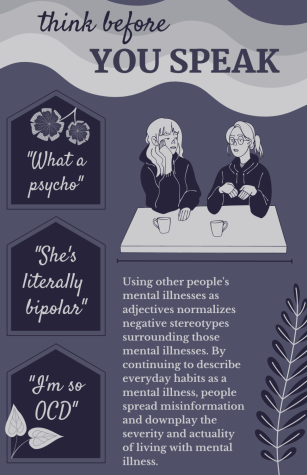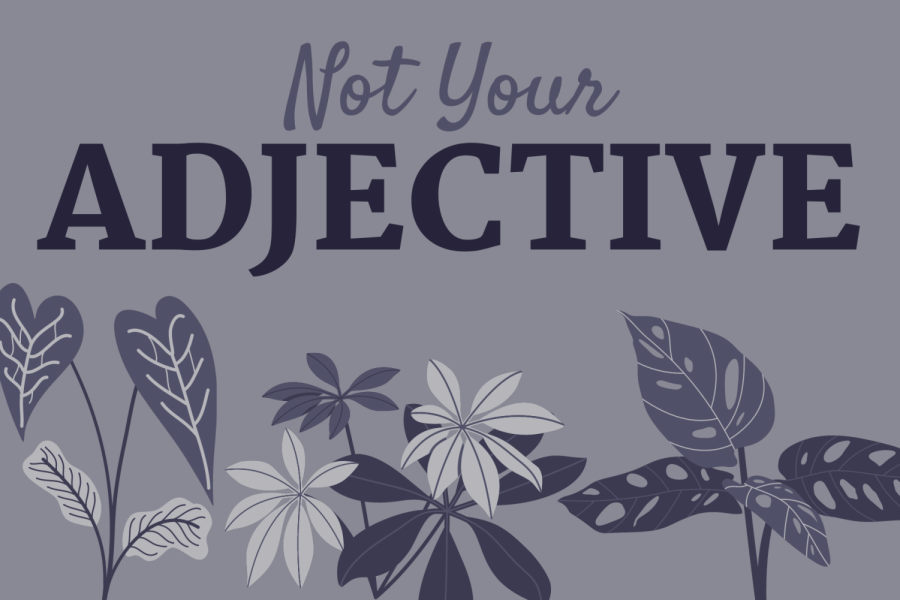Pencil moving across paper, I finish my worksheets in class. My teacher continues drawling on, filling a long class period with presentations and puns. My table partner turns to their friend quietly saying, “this class makes me so depressed.” Laughing, they turn back to their work.
Having depression and anxiety, I was no stranger to the ins and outs of mental illness, but this casual mention of depression pulled me out of the classroom mindset and dropped me into a mental space of reflection, questioning and more importantly frustration. Why do my countless hours spent overthinking equate to one student being upset about having to do a worksheet? Why does he get to use mental illness as his casual topic of conversation while I have to avoid mentioning anything for fear of ostracization?
Entering a modern century, people are no longer walking on eggshells around the topic of mental illness. With stores selling books about mental health and celebrities opening up about their own struggles, efforts to make others feel less alone have not gone unnoticed. Celebrities such as Demi Lovato, Michael Phelps and Simone Biles have all spoken honestly about their mental health.
Despite all of the movements meant to remove stereotypes around mental illness, lying beneath these media developments are harmful comments used in everyday speech. The issue appears to be as simple as one word or phrase in conversation, but the effects are much more damaging. Ingrained into the English language are words such as “insane,” “bipolar,” “psycho” and “OCD.” Even more jarring is people saying “I’m going to kill myself” at any minor inconvenience. Just because we are used to hearing these phrases does not mean they are okay to say.
When people use mental illnesses as adjectives, the severity and struggle of the actual mental illness is diminished. Intrusive thoughts and obsessive patterns of Obsessive Compulsive Disorder (OCD) turn into wanting to be organized. Flashbacks and nightmares from Post Traumatic Stress Disorder (PTSD) turn into one slightly negative memory. Manic and depressive episodes from bipolar disorder turn into a couple mood swings. People begin to joke about suicide at any minor inconvenience. Suicide is a devastating and constant issue worldwide, being the second leading cause of death for young people according to the CDC. As a society, we hear these words describe normal actions on a daily basis, but know that this should not be normalized.

Not only does this minimize the effects of mental illness, but this choice of language also creates harmful false stereotypes. Even words that do not outright state a mental illness, namely “crazy” or “insane” foster a stigma surrounding disorders such as psychosis, schizophrenia and borderline personality disorder. Mental illnesses are typically out of a person’s control, so to assign negative connotations to a disorder is disrespectful.
One of the most catastrophic effects of this is how the stigma discourages people from getting help. By continuing to build up the stigma surrounding mental health, reaching out for help and therapy seems harder to achieve. According to the National Alliance on Mental Illness, only half of youth experiencing mental health disorders receive treatment. Continually misrepresenting disorders cultivates an environment in which the unaware carry on thriving while the struggling feel further ostracized from society. In a world where being considered “different” already excludes people enough, using language that discourages those with mental illnesses from getting help is incredibly destructive. With 13% of youth experiencing depression and 4% of adults experiencing suicidal thoughts according to Mental Health America, now more than ever we must change the way we view and talk about mental illness.
Take a step back and listen. As I have noticed, and you might notice too, “crazy,” “insane” and “OCD” are used more often than we realize, but to put it frankly, I’m not surprised. As a society we have grown apathetic to the feelings and hardships of others, and it shows. In order to destigmatize mental health, we need to change our language and promote stronger education about the realities of mental illness. At the end of the day, describing something as “bipolar” or “psycho” is not necessary but rather, a lack of regard for others.
Stop using mental illnesses as adjectives. Mental illnesses are real disorders that affect real people, and these real people are not your topic of careless conversation. Depression is more than feeling sad about one small thing. A minute annoyance is not an excuse to say “I’m going to kill myself.” People do not need to be described as “crazy” just for doing something you find funny. They are mental illnesses, not your adjectives.
Changing our language is just one crucial step on the path to destigmatizing mental illness.




![Sophomore Maryem Hidic signs up for an academic lab through Infinite Campus, a grading and scheduling software. Some students enjoyed selecting their responsive schedule in a method that was used school-wide last year. “I think it's more inconvenient now, because I can't change [my classes] the day of, if I have a big test coming and I forget about it, I can't change [my class],” sophomore Alisha Singh said.](https://pwestpathfinder.com/wp-content/uploads/2025/10/DSC_0012-1200x801.jpg)
![Senior Dhiya Prasanna examines a bottle of Tylenol. Prasanna has observed data in science labs and in real life. “[I] advise the public not to just look or search for information that supports your argument, but search for information that doesn't support it,” Prasanna said.](https://pwestpathfinder.com/wp-content/uploads/2025/10/DSC_0073-2-1200x800.jpg)
![Junior Fiona Dye lifts weights in Strength and Conditioning. Now that the Trump administration has instituted policies such as AI deregulation, tariffs and university funding freezes, women may have to work twice as hard to get half as far. "[Trump] wants America to be more divided; he wants to inspire hatred in people,” feminist club member and junior Clara Lazarini said.](https://pwestpathfinder.com/wp-content/uploads/2025/05/Flag.png)
![As the Trump administration cracks down on immigration, it scapegoats many immigrants for the United States’ plights, precipitating a possible genocide. Sophomore Annabella Whiteley moved from the United Kingdom when she was eight. “It’s pretty scary because I’m on a visa. When my visa expires next year, I’m not sure what’s going to happen, especially with [immigration] policies up in the air, so it is a concern for my family,” Whiteley said.](https://pwestpathfinder.com/wp-content/uploads/2025/05/DSC_0077-7copy.jpg)
![Shifting global trade, President Donald Trump’s tariffs are raising concerns about economic stability for the U.S. and other countries alike. “[The tariffs are] going to pose a distinct challenge to the U.S. economy and a challenge to the global economy on the whole because it's going to greatly upset who trades with who and where resources and products are going to come from,” social studies teacher Melvin Trotier said.](https://pwestpathfinder.com/wp-content/uploads/2025/05/MDB_3456-1200x800.jpg)



![Some of the most deadly instances of gun violence have occurred in schools, communities and other ‘safe spaces’ for students. These uncontrolled settings give way to the need for gun regulation, including background and mental health checks. “Gun control comes about with more laws, but there are a lot of guns out there that people could obtain illegally. What is a solution that would get the illegal guns off the street? We have yet to find [one],” social studies teacher Nancy Sachtlaben said.](https://pwestpathfinder.com/wp-content/uploads/2025/01/DSC_5122-1200x800.jpg)

![After a thrilling point, senior Katie Byergo and junior Elle Lanferseick high-five each other on Oct. 8. With teamwork and camaraderie, Byergo worked together in the game against Lafayette High School. “[Byergo’s] is really positive with a good spirit,” Lanferseick said. “I set her [the ball] and she hits it [or] gets the kill.”](https://pwestpathfinder.com/wp-content/uploads/2025/10/DSC_9349-1-e1761159125735-1200x791.jpg)
![Focused on providing exceptional service, sophomore Darsh Mahapatra carefully cleans the door of a customer’s car. Mahapatra has always believed his customers deserve nothing less than the best. “[If] they’re trusting us with their car and our service, then I am convinced that they deserve our 100 percent effort and beyond,” Mahapatra said.](https://pwestpathfinder.com/wp-content/uploads/2025/10/DSC_0018-1200x800.jpg)
![Sophomore Aleix Pi de Cabanyes Navarro (left) finishes up a soccer game while junior Ava Muench (right) warms up for cross country practice. The two came to Parkway West High School as exchange students for the 2025-2026 school year. “The goal for the [exchange] program is to provide opportunities for both Parkway students and our international exchange students to learn about other cultures, build connections and become confident, capable, curious and caring — Parkway’s Four C’s — in the process,” Exchange Program Lead Lauren Farrelly said.](https://pwestpathfinder.com/wp-content/uploads/2025/10/Feature-Photo-1200x800.png)
![Leaning on the podium, superintendent Melissa Schneider speaks to Parkway journalism students during a press conference. Schneider joined Parkway in July after working in the Thompson School District in Colorado. “My plan [to bond with students] is to get things on my calendar as much as possible. For example, being in [classes] is very special to me. I am trying to be opportunistic [meeting] kids [and] being in [the school] buildings. I have all the sports schedules and the fine arts schedules on my calendar, so that when I'm available, I can get to them,” Schneider said.](https://pwestpathfinder.com/wp-content/uploads/2025/09/IMG_5425-1200x943.jpeg)
![Gazing across the stage, sophomore Alexis Monteleone performs in the school theater. The Monteleone family’s band “Monte and the Machine” has been releasing music since 2012, but Alexis started her own solo career in 2024 with the release of her first single, Crying Skies. “My whole family is very musical, [and I especially] love writing [songs with them],” Monteleone said.](https://pwestpathfinder.com/wp-content/uploads/2025/09/DSC7463-1200x798.jpg)

![Leaping through the air, senior Tyler Watts celebrates his first goal of the season, which put the Longhorns up 1-0 against the Lafayette Lancers. Watts decided to play soccer for West for his last year of high school and secured a spot on the varsity roster. “[Playing soccer for West] is something I had always dreamed of, but hadn’t really had a good opportunity to do until now. It’s [really] fun being out [on the field], and I’m glad I decided to join the team. It’s just all about having fun with the boys and enjoying what time we have left together,” Watts said.](https://pwestpathfinder.com/wp-content/uploads/2025/09/DSC_1951-1200x855.jpg)


![Pitching the ball on Apr. 14, senior Henry Wild and his team play against Belleville East. Wild was named scholar athlete of the year by St. Louis Post-Dispatch after maintaining a high cumulative GPA and staying involved with athletics for all of high school. “It’s an amazing honor. I feel very blessed to have the opportunity to represent my school [and] what [it] stands for,” Wild said.](https://pwestpathfinder.com/wp-content/uploads/2025/05/unnamed-6-1200x714.jpg)

Joanne Roschbach • Mar 3, 2025 at 11:34 pm
Did anyone hear the congressman from Connecticut today refer to something “all over the place” as schizophrenic?!!
Emma Iswarienko • Dec 15, 2021 at 7:39 am
This is such an important topic, thank you so much for talking about it.
Emily Early • Dec 14, 2021 at 4:00 pm
Thank you for writing this. It’s so important, and you put it so well.
Lillie (system = The Leaves) • Dec 14, 2021 at 1:01 pm
A couple months ago we overheard a classmate and teacher joking about sending someone to a mental asylum for talking to themself. As a member of a plural system, one where me and my headmates talk to each other out loud regularly when not around others, this sort of stuff makes me really scared and uncomfortable. It makes it hard to believe we’ll ever not have to hide.